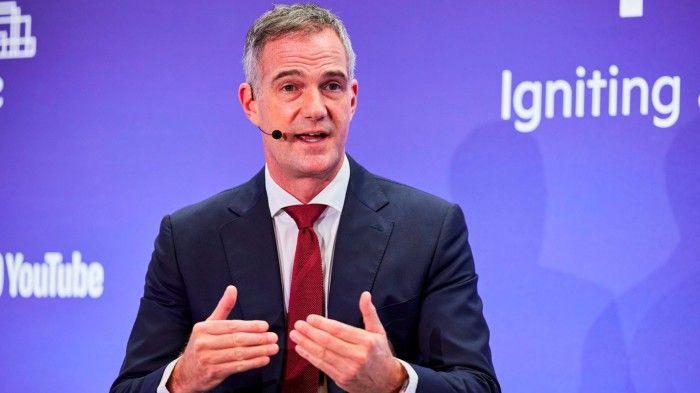UK Invests £4 Million in AI Project to Support Teachers
3 Sources
3 Sources
[1]
UK launches AI project to help teachers plan lessons, mark homework
As part of project, government documents like curriculum guidance, lesson plans, and student assessments will be provided to AI companies to train their tech to "generate accurate, high-quality content, like tailored, creative lesson plans and workbooks". The generative AI tools will help teachers mark work and create teaching material, the science and education departments said in a press release. "Today's world-leading announcement marks a huge step forward for AI in the classroom," said early education minister Stephen Morgan, part of the recently elected Labour government. Science Secretary Peter Kyle said the project aims to "ease admin burdens" and will "transform how we see and use public sector data". The project claims to have a "first-of-its kind approach to processing government data for AI". The previous Conservative government had announced investment of £2 million for AI resources in education. A government-commissioned research paper on public attitudes to AI in education published today found that while those surveyed agreed AI could help teachers, there were concerns of overreliance on the technology. Parents and students "were worried about the loss of key social and technical skills and reduced human contact-time leading to unintended adverse outcomes", according to the research. UK schools have been rocked in recent years by teaching strikes over a decrease in salaries in real terms, while struggling to retain teaching staff in sufficient numbers.
[2]
U.K. invests £4 million in AI project to help teachers plan lessons and mark homework
As part of project, government documents like curriculum guidance, lesson plans, and student assessments will be provided to AI companies to train their tech to "generate accurate, high-quality content, like tailored, creative lesson plans and workbooks". The generative AI tools will help teachers mark work and create teaching material, the science and education departments said in a press release. "Today's world-leading announcement marks a huge step forward for AI in the classroom," said early education minister Stephen Morgan, part of the recently elected Labour government. Science Secretary Peter Kyle said the project aims to "ease admin burdens" and will "transform how we see and use public sector data". The project claims to have a "first-of-its kind approach to processing government data for AI". The previous Conservative government had announced investment of £2 million for AI resources in education. A government-commissioned research paper on public attitudes to AI in education published today found that while those surveyed agreed AI could help teachers, there were concerns of overreliance on the technology. Parents and students "were worried about the loss of key social and technical skills and reduced human contact-time leading to unintended adverse outcomes", according to the research. UK schools have been rocked in recent years by teaching strikes over a decrease in salaries in real terms, while struggling to retain teaching staff in sufficient numbers.
[3]
Brit teachers to be given homework-marking AI sidekicks
The UK government is set to equip teachers with AI tools to help them "mark and plan lessons." The project, which has £4 million of government investment behind it, will feed government documents - including curriculum guidance, lesson plans, and anonymized pupil assessments - into AI models, which will then spit out "accurate, high quality content." This is not a phrase generally associated with AI assistants. For example, we asked Microsoft's Copilot: "How many times does the letter r appear in raspberry?" It replied: "The letter 'r' appears twice in the word 'raspberry.'" To be fair to Microsoft, OpenAI's ChatGPT also thought there were two instances of "r" in "raspberry." Google's Gemini said: "The letter 'r' appears four times in the word 'raspberry.'" We certainly hope they fix that before teachers start using AI assistants to mark homework. According to the Department for Science, Innovation and Technology (DSIT), the government aims to ease administrative burdens on teachers. UK Science Secretary Peter Kyle said: "This is the first of many projects that will transform how we see and use public sector data. We will put the information we hold to work, using it in a safe and responsible way to reduce waiting lists, cut backlogs, and improve outcomes for citizens across the country." The £4 million in funding will be divided into £3 million for the content store itself - which will consist of teaching standards, guidelines, and lesson plans - and £1 million for AI companies that come up with "the best ideas to put the data into practice to reduce teacher workload." Moves to deal with teacher workload have been broadly welcomed, although the use of AI was greeted with caution. The UK's National Association of Head Teachers (NAHT) said that while it welcomed proposals on how pressure on school staff could be relieved, "we are also painfully aware that AI is not a substitute for a teacher - who will have the experience and understanding to get the best learning outcomes for children. "We would like to engage and collaborate with the government at the earliest opportunity to scope the potential for the use of AI, identify concerns and limitations, and ensure that any implementation of AI in education is thoughtful, responsible, and ultimately enhances the learning experience for all." Daniel Kebede, General Secretary of the National Education Union, said: "It is clear that to solve the teacher retention crisis, reducing workload must be a priority - but there must also be a serious and holistic approach both to issues of technology and workload reduction. "This means properly engaging with the profession to fully understand the implications of AI for education - both the opportunities but also the limitations, risks, and ethical concerns that AI presents. "Investment should be directed towards enhancing and embedding the voice of teachers and schools, so that AI tools and products genuinely reflect school and college priorities and are tested and evaluated by them." The Register asked the government how anonymity will be protected in the training set and how the scenario where an AI might end up marking homework generated by an AI from a lesson plan produced by an AI might be avoided, but we have yet to receive a response. ®
Share
Share
Copy Link
The UK government launches a £4 million AI project to assist teachers with lesson planning and homework marking. The initiative aims to reduce workload and improve educational outcomes.

UK Government Launches AI Initiative for Education
The United Kingdom has taken a significant step towards integrating artificial intelligence (AI) into its education system. The Department for Education has announced a £4 million investment in an AI project designed to support teachers in their daily tasks, particularly in lesson planning and homework marking
1
.Project Objectives and Implementation
The primary goal of this initiative is to alleviate the workload on teachers, allowing them to focus more on classroom instruction and student interaction. The project will involve the development and testing of AI tools across various educational settings, including primary and secondary schools, as well as further education colleges
2
.AI Capabilities and Benefits
The AI systems being developed are expected to assist teachers in several ways:
- Lesson Planning: AI will help create personalized lesson plans tailored to individual student needs.
- Homework Marking: Automated grading systems will streamline the assessment process.
- Administrative Tasks: AI will aid in reducing paperwork and other time-consuming administrative duties.
These tools aim to save teachers up to five hours per week, significantly reducing their workload
3
.Government Perspective and Future Implications
Gillian Keegan, the Education Secretary, emphasized the potential of AI to revolutionize the education sector. She stated that the technology could "reduce workload, improve outcomes for pupils, and make teaching an even more rewarding profession"
1
.Related Stories
Concerns and Safeguards
While the initiative has been met with enthusiasm, some educators and experts have raised concerns about the potential overreliance on AI and its impact on the human aspects of teaching. The government has assured that appropriate safeguards will be in place to ensure the responsible use of AI in education
2
.Timeline and Expected Outcomes
The project is set to run until March 2025, with the government planning to share the findings and best practices with schools across the country. This initiative is part of a broader effort to harness AI's potential in various sectors of the UK economy and society
3
.References
Summarized by
Navi
[1]
[3]
Related Stories
Tech Giants and Teachers' Union Launch $23 Million AI Training Initiative for Educators
09 Jul 2025•Technology

UK Government Plans to Commercialize Public Data for AI Development
01 Apr 2025•Policy and Regulation

Big Tech Invests Millions in AI Training for Teachers, Sparking Debate and Concerns
17 Oct 2025•Technology

Recent Highlights
1
ByteDance's Seedance 2.0 AI video generator triggers copyright infringement battle with Hollywood
Policy and Regulation

2
Microsoft AI chief predicts artificial intelligence will automate most white-collar jobs in 18 months
Business and Economy

3
Anthropic and Pentagon clash over AI safeguards as $200 million contract hangs in balance
Policy and Regulation





